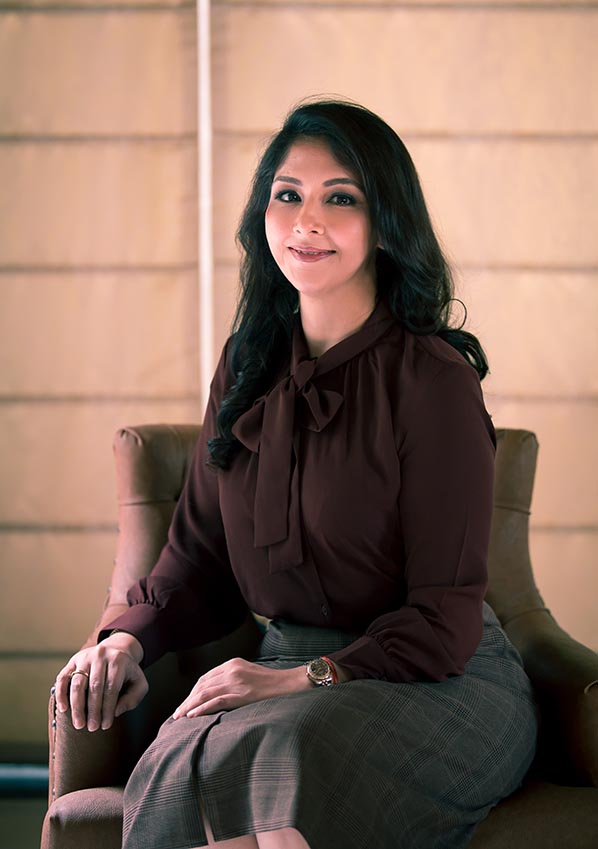Importance Of Mental Well-Being With Kanchan Rai


In the backdrop of an enmeshed Indian culture, Delhi-based Kanchan Rai, walks with people through their journey of self-discovery, enabling them to break through the invisible veneers that mask their vulnerabilities.
A Harvard Business School Graduate has a specialized certification in leadership development and authentic leadership development. With an aim to throw the spotlight on mental health, she conceptualized the holistic initiative Let Us Talk Foundation and is the mastermind behind its coaching methodology.
Conceptualized on the belief that the key to mindfulness is by overcoming the reluctance to look for it, Let Us Talk Foundation is a holistic enterprise that puts mind and wellness health at the forefront.
Sharing her more than a decade of experience of learning, honing and developing new skills in order to address overall mental health with PeakLife, Kanchan has created a space that marries technology and age-old wisdom to deliver contemporary and effective solutions.


Could you tell us more about your journey as a mental and emotional well -being coach?
My foray into counseling can be traced back to the time when I lost one of my close family members. In the midst of dealing with this personal loss, I decided to fly overseas to pursue a course in authentic leadership which taught me the significance of being vocal about one’s mental health. While I have been able to get past my own traumatic experience with professional help, I believe that it is important to talk about one’s mental health openly. Counselling has always been my true calling and I have been focussed to create more awareness around this space.
This inspired me to conceptualize the ‘Let Us Talk’ Foundation to help people with a reliable source to let their emotions flow out. Being a Harvard Business School certified trainer, at the organization I play multiple roles as a therapist, coach, and speaker. Serving as the Founder of Let Us Talk Foundation, I also wrestle the tag of a specialized certification in leadership development and authentic leadership development.
I have also been accredited as a globally certified coach from the International Coaching Federation (ICF). My approach is inclined by the world of psychology and systemic change that is focussed on developing restored systems, be it family or organisation. As someone who has been closely involved in the realm of mental wellness for over a decade, I feel that counseling lends you the freedom to choose yourself.
Although a challenging yet exhilarating journey, therapy is a journey of courage – of seeing oneself and be seen by others instead of allowing undesirable thoughts to mask our vulnerabilities.
Why did you choose ‘Let Us Talk’ as the name for your organisation and how did it all start?
As human beings, we tend to reach a point where we feel lost in life and dissolve ourselves in what is going on around us. Unable to recognise our true self we often resist listening to our inner voice of wisdom since we are afraid of what we might face. Hence, the sole motive behind starting ‘Let Us Talk’ was to allow conversations around mental illness to significantly open up, facilitating us to mindfully heal people.
Regardless of mounting awareness, mental health and therapy still continue to be on the fringes Through ‘Let Us Talk’, we are committed to destigmatising social issues and prioritize mental health. The organization is on a mission to standardize therapy as a way of life. It believes that each one of us deserves to hold on to and celebrate our individuality, without disgrace, fear and without giving in to the call for conformity. The organization follows an extensive methodology that leans towards human-centered and compassion-based approaches to uphold a sound mind health.
Who/what inspired you to get into a field which is considered a taboo in India?
Despite a tremendous amount of awareness, mind health is still considered to be on the periphery, and therapy is reflected to be an afterthought. Being one of the few adopters of this niche career path, my sole motive is to be able to craft normalcy to the art of therapy and counseling in India. When I made up my mind to embrace counseling as a profession, it wasn’t one of the most preferred vocational choices that people would normally take up.
When I conceptualized the Let Us Talk Foundation, I started my practice with limited clients, but that did not discourage my determination. Unravelling my own story as a professional, from the time I started, I had decided to make my counselees not feel ashamed of their mental situation. Much of this has been achieved by modelling them. For instance, I was often inquired by my clients if I personally had emotional issues in life, to which I would say yes and would share my experience with them.
In this way, I motivate them by telling them that although I may be, your therapist, yet I take help. The fact that my counselees are not shy to seek help is in itself a stepping stone towards success for me and the organization at large. There is no hide and seek when they come for counselling for any sort of life issues that they are dealing with. I feel by being more vocal about our emotional illness, we as a society can certainly reveal the untrue notions that have been afflicting this topic.
How does one distinguish between sadness and depression?
Sadness or feeling blue is a normal reaction to challenging situations like a loss or disappointment. Feeling unhappy from time to time is just another facet of human beings. In most cases, the feelings of sadness fade away quickly, allowing you to go about your daily life. When a person claims that he or she is feeling depressed, but if the feeling tends to go away on its own without impacting life in a big way, it possibly isn’t depression.
Experiencing depression is an emotional ailment that majorly affects your mood and challenges the way you comprehend yourself, and the way you understand and relate to things around you. It can medically be termed as clinical depression, a major depressive disorder, or unipolar depression.
While it may come up for no reason, it can last for a long time. Depressed people may exhibit symptoms like feeling worthless, hopeless, withdrawal from others, a problem with sleeping, or a change in appetite. In extreme cases, they may even have suicidal thoughts.
Another point to consider is that depression is not always noticeable by displays of emotion. Some depressed individuals may become emotionally unresponsive like appearing numb or beyond tears. This absence of emotions can be just as painful as prolonged sadness.
For depressed individuals, early intervention in the form of mental therapy or counseling is the key. Those experiencing one episode of depression is prone to subsequent episodes. Mind healing techniques can facilitate in averting this pattern from occurring. Therapy can effectively screen you for depression, and help you manage and treat your symptoms enabling you to feel better.
What kind of challenges and obstacles you faced when you started ‘Let Us Talk’?
The biggest challenge I faced while conceptualizing the ‘Let Us Talk’ foundation was to expunge the social stigma attached to the emotional health illness which still continues to exist. Starting a career in counseling was a brave decision that I made taking into consideration the legacy of Indian stereotypes around mental health.
As with every other Indian household, my immediate circle too was skeptical about my career plans. But I have always been adamant about following my dreams and this helped me unravel my love to provide emotional support to people. While I started on a very small scale, today the enterprise has been following a wide-ranging approach that leans towards human-centered and compassion-based approaches to maintain sound mind health.
Somehow, even today people tend to relate to therapy as going to someone to get advice. I truly believe your shoes are yours and you can never advise someone on how to lead their own life. All one can do is to be a reliable source guiding their emotions to flow in the right direction.
What is your source of motivation especially during these different times that’s keeping you moving?
In the backdrop of the current global crisis, wherein emotional turmoil is at the peak, I look forward to becoming a pillar of revolution facilitating people to embrace their realism. Through counseling and therapy, the organization intends to build a safe environment for individuals to embrace themselves for who they are.
My source of motivation has always been to mentor and empower people by providing them hope to deal with their adversities alongside helping them to come out of it stronger. Looking back at my journey, I am astounded by the hardships I faced and overcame because of this process.
More from our site
Recent Posts
Shaping Tomorrow’s Golf Champions With Leela Palace Bengaluru
The 3rd edition of The Leela Golf Tournament celebrated young talent and brought together skill, precision and camaraderie!
The 3rd edition of The Leela Golf Tournament celebrated young talent and brought together skill,…
The Duo Behind KAIA Goa & Gigi Bombay, Redefines Hospitality
In conversation with the founders of Pawan Shahri and Nikita Harisinghani, the duo behind Chrome Hospitality Asia
In conversation with the founders of Pawan Shahri and Nikita Harisinghani, the duo behind Chrome…
Precision, Durability, and Swiss Legacy
Victorinox launches the Swiss Army collection, featuring three distinct models that emphasise exceptional quality, resistance and versatility
Victorinox launches the Swiss Army collection, featuring three distinct models that emphasise exceptional quality, resistance…
A New Era of Luxury Interiors With Sussanne & Gauri Khan
Sussanne Khan & Gauri Khan unite to bring an awe-inspiring, six-storey sanctuary of luxury, art, and design in Hyderabad
Sussanne Khan & Gauri Khan unite to bring an awe-inspiring, six-storey sanctuary of luxury, art,…
Air India x Lufthansa: Fly To These International Destinations Now
Expanding their codeshare partnership, Air India and Lufthansa Group have added 100 new routes to their combined network
Expanding their codeshare partnership, Air India and Lufthansa Group have added 100 new routes to…
Luxury’s Most Recent & Vibrant Launches This Season
The luxury landscape is brimming with bold innovations, striking partnerships, and immersive experiences
The luxury landscape is brimming with bold innovations, striking partnerships, and immersive experiences

